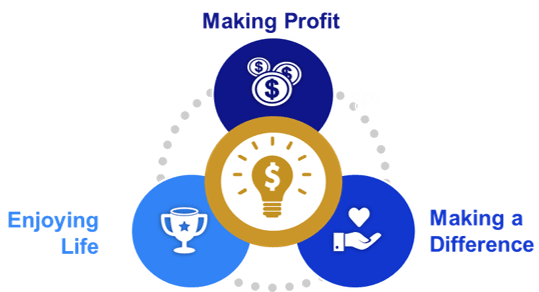
On Friday, May 5, 2017, Dr. Stephie Althouse (she goes by “Dr. Stephie”) was interviewed by Robert Donnell from P5 Marketing about STEM women (STEM = science, technology, engineering, and math). He asked her about what she thinks the challenges are and how we can overcome them. He also asked her about her own path and experiences, being a STEM woman herself.
Here we give you the podcast as well as the transcription of it. Enjoy! And please follow us on LinkedIn and Facebook and contribute your experiences to this conversation. Thank you!
Here is the interview (podcast):
If you prefer to read the interview here it is:
Robert: Hi. This is Robert from P5 Marketing and this program is part of our ongoing conversations with our clients and thought leaders. My guest today is Dr. Stephie Althouse. She’s an award-winning Ph.D. chemist, innovator, a self-professed geek, and she is the CEO and founder of Top-Notch CEO. Welcome, Dr. Stephie.
Dr. Stephie: Thank you. Thank you so much for having me.
Robert: Top-Notch CEO is a leadership training and coaching program for women in STEM, geeks, and the people who manage them. I read that description on your website. I think it’s very clear, and your passion is working with STEM women. Can you tell us a little bit about this passion?
Dr. Stephie: Yes, absolutely. Most passions come from having been there and done it yourself.
Robert: That’s true.

Dr. Stephie: So, that’s what happened here. Basically, STEM women is a subset of the geeks who I love to work with. Let’s first say, what the heck even is STEM? In case somebody doesn’t know. It’s science, technology, engineering, and math. We’re talking about women who are in these geeky fields, and the challenge is that there are not that many women still to this day in those STEM fields. STEM Women are underrepresented by quite a bit. and especially, in engineering, we’re around 13% or some such. There are some challenges about how do we get more women into these fields and especially, how do we get more women into leadership positions in those fields?
What Was Your Path Like?
Robert: That’s true. I mean, you’re a woman in STEM, actually. You started out in the basic science portion of the business. What was your path like? How did that build for you?
Dr. Stephie: Thank you for asking. The way it happened is I am very passionate about science, figuring out how things work and how to create new innovations that hopefully can make our life better. So, I decided to study chemistry. I was also quite interested in biology. I studied chemistry, got my PhD in that field, and was actually well on the path to staying in academia when, over a little bit of time, during my post-doctoral research, I realized that I really would like the innovations or the research that we do to lead to innovations that people can use sooner rather than later.
Eventually, I Decided to Leave Academia. I came to San Diego and Joined a Small High-Tech Company.
Eventually, I decided to leave academia. I came to San Diego and joined a small high-tech company, and it was really a fabulous experience. It was a fairly rapidly growing company given that it was only about 40 people when I joined. At the time when I joined, I was the only female technical staff. So, you can imagine this is a company full of PhDs and full of engineers, and I was the only woman. I didn’t really think too much about it. I mean, obviously, you know that is the case, but I became basically one of the guys. I had a good relationship pretty much with everybody, and I just went about my work.
What is the Path to Advancement?

As the company grew and as the people who had joined the company became more senior … the company structure was pretty flat and so the question came, what is the path to advancement? There really wasn’t particularly a path to advance. At one point, I actually walked into the CEO’s office and said, “I think we should have a CTO.” I had prepared a write-up about what the CTO’s job should be. We didn’t have an official CTO. What was funny was I got half the job of what I had proposed, which was I had pointed out that we didn’t do a particularly good job about protecting our intellectual property. I got that job, although I didn’t get any increase in title or, for that matter, any increase in pay, but I did get an increase in experience. So, that’s a little bit part of the story.
Eventually, the company actually got acquired twice. Once pretty early on, shortly after I joined the company. But we were still independently operated, and the company that bought us was maybe five times our size or maybe even only two times our size. So, for the most part, they left us to our own devices. Eventually, we started to collaborate a little bit with them. A few years later, we got acquired by a very large company, one of the biggest ones on the planet. That’s when I started to look at what are the opportunities to advance in this new situation. I realized that all the people who were the “bigger bosses”, they didn’t have PhDs. They had bachelor’s or maybe an MBA. When you look at their work history, they had basically packed up themselves and their family every two years and gone to a different division of this big company. That’s when I decided that that path was not for me.
My Entrepreneurial Blood Was Boiling Over.
My entrepreneurial blood was boiling over and had been for some time. I had basically built a business within the business. I realized this business, even though it felt like it was my business, it really wasn’t. I can just tell you that over the course of all of this, I’ve attended many conferences. I’ve been part of the Athena Group in San Diego, which is for executive women in the sciences area, and so I have many contacts to STEM women basically all over the country, even in different parts of the world. I know the problem first-hand. I also know a lot of the debate that happens about STEM women. How do we get more women into STEM? What do we have to do early on? What do we have to do later on once women have actually gotten their degree?
A part of the problem is … when I went and studied chemistry, actually about 50% of the students were women. It’s way higher in chemistry than it is engineering. But what’s interesting is in the professional world, we don’t see anywhere near those numbers. Where did they all go? That’s a very good question. Why did they leave? Why didn’t they stay in the field? We could talk a little bit about that and talk a little bit about what is the solution here.
Your Approach to the Solution is Really Empowering Women Rather Than Trying to Affect National Policy?
Robert: Your approach to the solution is really empowering women rather than trying to affect national policy. Is that a fair statement?
Dr. Stephie: Absolutely. Yes. I mean, I’m not saying it’s bad to try and facilitate the change somewhat through policy. However, I think the much more effective way is to do it through empowering women to actually look at the root causes. Why is this happening, and what can we really do about it rather than forcing people to hire using quotas and things like that, which can also lead to lot of resistance.
Robert: Resistance and resentment, right?
Dr. Stephie: Correct.
How Do We Get More Women into STEM Fields?

Robert: So, how do we get more women into STEM fields?
Dr. Stephie: First of all, how do we get more women to study in STEM fields? That would be the first part. That’s of course up to us as parents, and the teachers at the early stages, and our society as a whole, to encourage girls to go into these sciences and not see it as something that is predominantly just of interest to boys.
I was very fortunate in that. I mean, my parents were both teachers, however, not in the science area. My parents were both German teachers – I grew up in Germany – and also history teachers. When I started to show an interest in going into the sciences, they said, “You know, we can’t really help you there very much,” but they didn’t discourage me. I had an extremely awesome chemistry teacher in Middle and High School who really encouraged me a lot.
I, in fact, switched from a school that was very much focused on language and social sciences to a school that was much stronger in also the science area. I mean, they were strong in everything, but they were much stronger in the science area than the first school I had gone to. I had this feeling, “Oh man, I’m totally behind. What can I do? I probably can’t compete against these other kids or be as good as the other kids who have already had all that science.” This teacher said, basically, “Bollocks. I don’t believe that at all,” and within a very short amount of time, I was top of the class. So, it’s encouragement in the early stages.
Robert: Then …
Dr. Stephie: Well, then …
Robert: It’s funny. I think society is shifting more and more to that direction. I think fathers always want the best for all their children, sons and daughters. I don’t know. I see that evolving, but once women get into STEM fields and they begin to have jobs and seek employment, what additional challenges do you see them facing?
Once Women Get into STEM Fields … What Additional Challenges Do You See Them Facing?

Dr. Stephie: Then there are challenges that basically range from “Okay, so you got your education. Now, what?” The joke is you got a BA or a BS, then an MS and a PhD, and now I want a J-O-B. Now, more than likely, the first you do is get a job rather than start a company. I mean, very few people start off their career being an entrepreneur right away, although there are some. The problem is, in a nutshell, that women often really don’t advance as far as they could. There are a variety of causes and some [of them] – this is the good news – are completely unnecessary and are, actually, unrelated to discrimination. We’ll talk about this in a second.
The other part of the problem is it’s a challenge [for companies]. It’s a huge challenge for companies that hire highly talented women if somehow we lose these women – because hiring someone, especially someone of high talent, it’s an investment. If they lose that person that’s a loss to them. It’s a significant financial loss and opportunity loss. What causes this often is perhaps the lack of opportunity for growth and advancement, and in fact, statistics show that. It also conflicts between the demands of work and family, and then, of course, both factors can come together. So … please go ahead.
Robert: I’m sorry.
… Three Factors That We Could Dive a Little Deeper Into. The First One is Mentorship.
Dr. Stephie: Well, I was going to point out I think there are three factors that we could dive a little deeper into. There’s mentorship. There’s how we as women tend to pursue promotions, which may be different from how men pursue it. And then there’s what we could call the mommy factor. In terms of mentorship, women often don’t get the benefit of mentorship the same way that guys get it because they’re not in the club. I did notice that a little bit in this company, even though I felt well-accepted and well-liked, and so forth. I think there was a little bit [of a disadvantage], though at a really high level – you just never quite know whether that’s happening or not happening. It’s very hard to tell.
There’s also the fact that men could be afraid to offer mentorship for fear of getting misconstrued. “Oh, you’re hanging out so often with so and so. What’s going on? …” Then the other part is there’s a lack of opportunity for acquiring the business, strategic, and financial acumen that’s required for top leadership positions. The problem is that women often are not told they even need those skills. By the way, this is a problem for basically all geeks, all top experts. When I say geeks, I mean those are people who are very passionate about a subject, so passionate that they’ve spent an extraordinary amount of time to get even better at that subject. They’re top experts who offer, often times, expertise that no one else has, or very few people have.
All geeks basically have this issue that we spend all this time going to “geek school”, let’s say in my case chemistry school, but we didn’t have any courses on business or strategy or financial acumen or leadership. As you progress in your career, these skills become more and more important. Unless the company makes an investment in you or you go out yourself and get those skills, or you’re fortunate enough to get really good mentoring, you just don’t have it. That can keep you stuck somewhere in middle management. That’s what happens to a lot of women. It happens to some guys, too, but it happens disproportionately to women.
You Mentioned That Women Are Going After Promotions Differently Than Men?
Robert: You mentioned that women are going after promotions differently than men. Can you talk a little bit about that?
Dr. Stephie: Yeah. So, there was actually a recent Harvard Business Review article that talked about that, and it’s called the Disappointment Factor. They found that women actually give up on pursuing promotions way more quickly than men do. So, if it didn’t work out the first time, they’re not as likely to go after it again. I mean, that’s something that we as women can control. We can say to ourselves, “Hey, just because they said no the first time doesn’t mean they can’t say yes the second, third or fourth or fifth time,” or maybe we got to go to a different company. But you got to stay after it and perhaps be a little bit more aggressive. Just pursue your goal and do whatever it takes and don’t say to yourself I can’t [do it] after somebody said no.
You Talked About the Mommy Factor…

Robert: That’s good advice. What about this … you talked about the mommy factor.
Dr. Stephie: Right. So, the mommy factor is an obvious difference. No matter how many equal rights we have, women are still the ones who actually give birth. I’ve been through that and I feel very blessed that I’ve done that. I will tell you that when I was younger, I wasn’t sure whether it’s really possible to … how should I say this? To have a really successful career and be a mom at the same time and not have one or the other feel like it’s getting the short end of the stick, as one says, right?
Robert: Right.
Dr. Stephie: That became a big question for me, and in fact, a lot of my work consists of solutions or answers to this very question. The mommy factor has to do with losing female talent to the mommy track. There can be issues with continuity in leadership during maternity leave. That may be one of the factors that [goes on] quite silently but still, in reality, it is happening. Women might not get promoted to top leadership positions in a place and at a time when the employer might think, “Okay, it’s about time for this woman to have a kid if she does.” Although you look at Marissa Mayer at Yahoo. There are certainly more and more examples of us women breaking through that. and I think it behoves all of us to think outside of the box and to not have … well, I almost said nine to five thinking, but in reality, STEM women and also men in STEM, we don’t work nine to five, anyway. We work typically a lot more. That’s my experience, at least.
When I talk to people who are in high-tech, high-demand companies, they tell me that often times – as I said, it’s a high-demand, fast-paced environment – people do burn out. If companies could figure out that that’s actually a bad idea for women, but also for men, and they started to shift their culture a little bit, they would save money on that lost talent. They can still achieve just as much, I would say, based on my own experience, on my own work, in my own life as well as with my clients. I can tell you that working harder isn’t always the solution. In fact, working smarter is and there are ways to do that. The mommy factor, it’s never going to go completely away, I would think, but it can be greatly diminished.
STEM Women and Diversity in the Workplace… it Really Improves the Bottom Line of Companies if Executed Properly?

Robert: Let me ask you a question. STEM Women and diversity in the workplace, it’s not just a good idea or a socially powerful idea. It really improves the bottom line of companies if executed properly, doesn’t it? Ensuring a diverse and inclusive workplace can indeed have a positive impact on a company’s bottom line. To achieve this, implementing steps to prevent workplace harassment is crucial.
Dr. Stephie: Yes, it absolutely does. The reason is – this is also a big aha that I had somewhere throughout my own career – that when you’re the only woman in a team of men, it can certainly, in fact, it is very likely to lead to you behaving very similar to your male colleagues because you want to fit in. The downside of all that is that you may not be playing on your own strengths. Obviously, there are some differences between men and women. We have different leadership styles in part. Women tend to be more collaborative in their thinking. Men might be a little bit more competitive in their thinking, etcetera.
Well, it turns out it’s not that one is better than the other but the mix of it is actually the most effective. So, the more perspectives we allow to be brought in, the better it is. In fact, there was a recent study that said that, and that was also reported in the Harvard Business Review magazine, if you have no women in corporate leadership, basically not the CEO, not on the board, not in other C-suite positions, and you go from that to a 30% female share, not even 50 but just 30, that leads to a one percentage point increase in net margin, which for the typical firm leads to or translates to a 15% increase in profitability. That’s pretty massive.
Robert: That IS pretty massive.
You Cut Out Half of Your Brain, the Collective Brain if You Will, Then You’re Getting Half of What You Could Have?
Dr. Stephie: When you think about why it’s in part because of the things I just said with the leadership styles and putting in more different perspectives. It’s just how idiotic is it to leave half of the world out of top leadership positions and expect that you’re going to have the same amount of wisdom and the same degree of problem-solving happening? You cut out half of your brain, the collective brain if you will, then you’re getting half of what you could have. That’s one way of looking at it.
Robert: That’s a very realistic way of looking at it. Thinking forward, what contributions do you feel that you’re able to make now for STEM women and women who are considering STEM careers?
What contributions Are You Able to Make Now for STEM Women and Women Who are Considering STEM Careers?

Dr. Stephie: Well, it’s on the leadership and business acumen end of things. You can think of this as rocket fuel. Here you have all these STEM experts of both genders and the men are more likely to get put under the wing of another man already in a top position and get mentored for the reasons we just talked about. I’m not saying that’s always the case. Just that statistically, it is.
Robert: Particularly, if you have a company that has an overwhelming number of men versus women, then the women don’t have as many opportunities or mentorship just out of sheer numbers.
Dr. Stephie: Right. So, as soon as you have some women in top positions, the likelihood that emerging women leaders in STEM get mentorship goes up, hopefully, dramatically.
Robert: Right.
Dr. Stephie: We offer programs where STEM women can systematically learn leadership and business skills and along with that strategic and financial acumen. None of that was ever taught in school, in the geek school, whether that’s chemistry school or physics school or engineering or whatever discipline we’re talking about here. By the way, it’s not a problem that is completely only isolated to STEM. You go to law school, well, did they teach you business there? Probably not. They taught you law. It’s basically true for all top experts.
Focusing back on STEM, this is rocket fuel to your career, and that rocket fuel can be applied at different stages of your career. It could be that you’re in a job in a STEM company, and you’re looking for the quickest way to advance, the quickest way you could come up with. This is a huge accelerator – and you don’t actually have to stop earning money, stop your career in the STEM field and go a business school, and get another degree. What we do is extremely practical. The things that we teach and coach are exactly aimed at the STEM environment because we know that environment. We speak that language because we’ve been there and done that.
What I had to do is… literally, my own path to complete that a little bit more, was … as we were coming up with innovations, I started to write research grants. I had to write commercialization paragraphs, and I thought about it, and I thought, “Gosh, I have never had any training on this, but it’s really intriguing to me”. I asked some colleagues of mine what they write in their proposals on this. They’re like, “Don’t worry about it. The government is not really that serious about wanting us to commercialize this,” and I thought, “Wait a minute. What are we doing?”
To Me, One of the Worst Things is that You’re Going to Have a Tombstone on Your Grave that Says, “Still So Much Talent Inside.” That’s Not Acceptable.
I left academia so that we could work on innovations that can really be applied. I’m passionate about applying it. I’m passionate about making a difference. I’m passionate about teaching STEM women and coaching them around really having that focus of making a difference with their talent because to me, the worst thing that can happen is, well, one of the worst things anyway, is that you’re going to have a tombstone on your grave that says, “Still so much talent inside.” That’s not acceptable. Not to me.
A Lot of People Think, “Oh, Wealth is Money.” Well, it is Money, But it’s not Only Money.

It’s about taking your talent and transforming that into what we call wealth. Wealth isn’t just money because a lot of people think, “Oh, wealth is money.” Well, it is money, but it’s not only money. You can think of it like a three-pronged stool or a three-legged stool. One leg is money. If you’re an employee, it’s income or bonuses or perks or whatever they give you. If you’re a business owner, now we’re talking about revenue, and actually, we’re talking about profit.
Then the second leg is making a difference, making an impact with your skill on whatever you’re working on, whether that’s [helping] local clients or a technology that can be rolled out globally, whatever it is, but making a difference [is what I’m talking about]. Because to me, that’s where you derive a lot of your satisfaction and your fulfilment in your professional work.
Some People Describe that as Work-Life Balance, and That’s Fine. I think it Can Go a Lot Deeper Than That. You Can Get to the Spot Where You Know That You Can Create and Author Your Life.
Then the third factor is to create a quality of life that you love. Some people describe that as work-life balance, and that’s fine. I think it can go a lot deeper than that. It can go into literally getting to the spot where you know, you realize that you can create and author your life. That’s not a conversation that people typically find in any kind of STEM-related graduate school or whatever it is.
Robert: Yeah. Okay. I think I know the topic for our next interview.
Dr. Stephie: Cool.
Robert: The concept of work-life balance, and understanding wealth, and how it works in your life is certainly worthy of another deep dive, but I think we’ve run out of time.
Dr. Stephie: Okay. That’s totally fine. I’ve really enjoyed this. Thank you for having me.
Robert: I want to thank you for being on the program. I think there’s a lot of great information here for people to chew on, and they can find you on the web at www.topnotchceo.com and I think your website is, by the way, awesome. There’s a lot of information there on all of the topics that we discussed today. That’s T-O-P-N-O-T-C-H-C-E-O.com. I’d like to thank everybody, thanks, Dr. Stephie, and we’ll be back.
Dr. Stephie: Absolutely. My pleasure.
Robert: Talk to you soon.
Dr. Stephie: Thank you.
Robert: Bye-bye now.
If you’re interested in STEM or health-related jobs, you may look up UTMB Health or similar companies.
